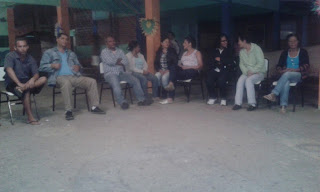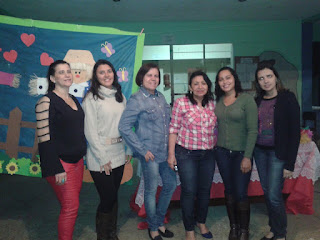Bem vindos ao nosso Blog, aqui você encontrará sugestões de leituras e de material para EJA.
"Ensinar não é transferir conhecimento, mas criar as possibilidades para sua própria produção ou a sua construção." Paulo Freire
segunda-feira, 27 de julho de 2015
quarta-feira, 1 de julho de 2015
Atividade de Inglês para EJA - 4º período - 2º segmento
Simple Past Tense
·
Como
se forma: de modo geral, acrescenta-se -ed
ao infinitivo dos verbos.
I walked
You walked
He walked
She walked
It walked
We walked
You walked
They walked
·
O
passado simples é usado para expressar ações acabadas em um tempo definido. É geralmente
empregado com advérbios de tempo: yesterday,
ago, last..., etc.
Ex.: I walked to school yesterday.
·
O
passado simples pode expressar também hábitos passados.
Ex.: I always walked to school when I was five years old.
·
Em
inglês há verbos regulares e irregulares.
·
Para
se formar o passado simples dos verbos regulares acrescenta-se -d / -ed ao verbo.
Ex.: Love – loved talk
– talked play – played
·
Se
o verbo terminar em -y precedido de
consoante, troca-se a o -y por -ied.
Ex.: carry – carried study – studied hurry – hurried
·
Se
o verbo terminar em sílaba forte formada por consoante / vogal / consoante,
dobra-se a última consoante e acrescenta-se -ed.
Ex.: stop – stopped occur
– occurred permit – permitted
·
Os
verbos irregulares não seguem as regras acima para a formação do passado.
·
No
passado os verbos têm a mesma forma para todas as pessoas.
·
Afirmativa: He
studied. He spoke.
Negativa: He did not study. He did not speak
Interrogativa: Did he study? Did he speak?
Negativa: He did not study. He did not speak
Interrogativa: Did he study? Did he speak?
·
Forma
abreviada: didn’t (did not).
·
Nas
formas negativa e interrogativa, em que se usa o verbo auxiliar (did), o verbo
principal fica no infinitivo, sem to.
Exercises
1) Supply the Simple Past Tense of the verbs in parentheses.
a) I _______________ (try) to
talk to Helen last night.
b) He ______________ (love) his old
dog very much.
c) We ______________ (dance) a
lot last night.
d) She ______________ (study)
hard and __________ (pass) the examination.
e) I ______________ (meet) her
five minutes ago.
f) They _______________ (leave)
home very early yesterday.
g) We ________________ (make) a
delicious cake last week.
2) Put the sentences into the interrogative form.
a) They worked together for many
years.
_______________________________________________________________
b) I studied English yesterday.
_______________________________________________________________
c) She went to school by car.
_______________________________________________________________
d) He gave me his telephone
number.
_______________________________________________________________
3) Put the sentences above into the negative form.
a) _____________________________________________________________
b) _____________________________________________________________
c) _____________________________________________________________
d) _____________________________________________________________
4) Choose the correct alternative.
a) Where did he (go, went)?
___________
b) When did they (came, come)
from work? _________________
c) What time did you (arrive,
arrived) last night? ______________
d) When did he (break, broke) the
vase? _________________
5) Ask questions. Use the words in parentheses.
a) He went to the movies. (Where)
Where did he go?
b) They bought a new car. (What)
_______________________________________________________________
c) She taught French last year.
(When)
_______________________________________________________________
d) We traveled by plane. (How)
_______________________________________________________________
e) She got up late because she
was tired. (Why)
_______________________________________________________________
Assinar:
Postagens (Atom)











